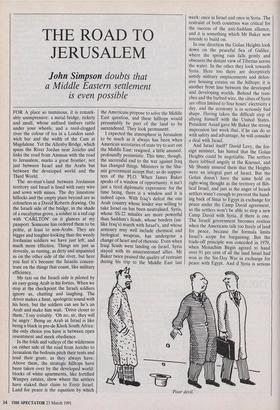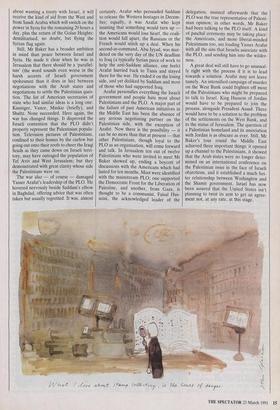THE ROAD TO JERUSALEM
John Simpson doubts that a Middle Eastern settlement is even possible
FOR A place so numinous, it is remark- ably unimpressive: a metal bridge, rickety and small, whose unfixed timbers rattle under your wheels, and a reed-clogged river the colour of tea in a London sand- wich bar and the width of the Cam at Magdalene. Yet the Allenby Bridge, which spans the River Jordan near Jericho and links the road from Amman with the road to Jerusalem, marks a great frontier, not just between Israel and the Arabs but between the developed world and the Third World.
The no-man's-land between Jordanian territory and Israel is lined with rusty wire and sown with mines. The dry limestone hillocks and the empty plain beyond are as colourless as a David Roberts drawing. On the Israeli side of the bridge, in the shade of a eucalyptus grove, a soldier in a red cap with 'CARLTON' on it glances at my passport. Someone has ordered them to be polite, at least to non-Arabs. They are bigger and tougher-looking than the weedy Jordanian soldiers we have just left, and much more effective. Things are just as slovenly, as rusting, as dirty and unpainted as on the other side of the river, but here you feel it's because the Israelis concen- trate on the things that count, like military efficiency. My taxi on the Israeli side is piloted by an easy-going Arab in his forties. When we stop at the checkpoint the Israeli soldiers ignore us, chatting and laughing. The driver makes a faint, apologetic sound with his horn, but the soldiers can see he's an Arab and make him wait. 'Drive closer to them,' I say irritably. 'Oh no, sir, they will be angry.' Being an Arab in Israel is like being a black in pre-de Klerk South Africa: the only choice you have is between open resentment and meek obedience.
In the folds and valleys of the wilderness on either side of the road from Jericho to Jerusalem the bedouin pitch their tents and tend their goats, as they always have. Above them, the strategic hilltops have been taken over by the developed world: blocks of white apartments, like fortified Wimpey estates, show where the settlers have staked their claim to Eretz Israel. Land for peace is the equation by which the Americans propose to solve the Middle East question, and these hilltops would presumably be part of the land to be surrendered. They look permanent.
I expected the atmosphere in Jerusalem to be much as it always has been when American secretaries of state try to sort out the Middle East: resigned, a little amused, profoundly pessimistic. This time, though, the successful end to the war against Iraq has changed things. Ministers in the Sha- mir government accept that; so do suppor- ters of the PLO. When James Baker speaks of a window of opportunity, it isn't just a tired diplomatic expression: for the time being, there is a window and it is indeed open. With Iraq's defeat the one Arab country whose leader was willing to take Israel on has been neutralised. Syria, whose SS-22 missiles are more powerful than Saddam's Scuds, whose borders (un- like Iraq's) march with Israel's, and whose armoury may well include chemical and biological weapons, has undergone a change of heart and of rhetoric. Even when Iraqi Scuds were landing on Israel, Syria stayed with its unaccustomed allies. Mr Baker twice praised the quality of restraint during his trip to the Middle East last week: once in Israel and once in Syria. The restraint of both countries was critical for the success of the anti-Saddam alliance, and it is something which Mr Baker now intends to build on.
In one direction the Golan Heights look down on the peaceful Sea of Galilee, where the spring rain falls gently and obscures the distant view of Tiberias across the water. In the other they look towards Syria. Here too there are deceptively untidy military emplacements and defen- sive housing estates on the hilltops: it is another front line between the developed and developing worlds. Behind the tren- ches and the barbed wire, the cities of Syria are often limited to four hours' electricity a day, and the economy is in seriously bad shape. Having taken the difficult step of allying himself with the United States, President Assad gave Mr Baker the strong impression last week that, if he can do so with safety and advantage, he will consider a deal with Israel.
And Israel itself? David Levy, the for- eign minister, has hinted that the Golan Heights could be negotiable. The settlers there lobbied angrily at the Knesset, and Mr Shamir assured them that the Heights were an integral part of Israel. But the Golan doesn't have the same hold on right-wing thought as the territory of Bib- lical Israel, and just as the anger of Israeli settlers wasn't enough to prevent the hand- ing back of Sinai to Egypt in exchange for peace under the Camp David agreement, so the settlers won't be able to stop a new Camp David with Syria, if there is one. The Israeli government becomes restless when the Americans talk too freely of land for peace, because the formula limits Israel's scope for bargaining. But the trade-off principle was conceded in 1979, when Menachim Begin agreed to hand over 91 per cent of all the land Israel had won in the Six-Day War in exchange for peace with Egypt. And if Syria is serious
'Poor devil.'
about wanting a treaty with Israel, it will receive the kind of aid from the West and from Saudi Arabia which will switch on the power in Syria for the remaining 20 hours a day, plus the return of the Golan Heights: demilitarised, no doubt, but flying the Syrian flag again. Still, Mr Baker has a broader ambition in mind than peace between Israel and Syria. He made it clear when he was in Jerusalem that there should be a 'parallel- ism' (the word sounds even worse in the harsh accents of Israeli government spokesmen than it does in his) between negotiations with the Arab states and negotiations to settle the Palestinian ques- tion. The list of American secretaries of state who had similar ideas is a long one: Kissinger, Vance, Muskie (briefly), and Shultz. None succeeded. Here again, the war has changed things. It disproved the Israeli contention that the PLO didn't properly represent the Palestinian popula- tion. Television pictures of Palestinians, confined to their homes by the curfew but going out onto their roofs to cheer the Iraqi Scuds as they came down on Israeli terri- tory, may have outraged the population of Tel Aviv and West Jerusalem; but they demonstrated with great clarity whose side the Palestinians were on.
The war also — of course — damaged Yasser Arafat's leadership of the PLO. He hovered nervously beside Saddam's elbow in Baghdad, offering advice that was often taken but usually regretted. It was, almost certainly, Arafat who persuaded Saddam to release the Western hostages in Decem- ber; equally, it was Arafat who kept insisting that something would turn up — the Americans would lose heart, the coali- tion would fall apart, the Russians or the French would stitch up a deal. When his second-in-command, Abu Iyyad, was mur- dered on the very day of the UN deadline to Iraq (a typically Syrian piece of work to help the anti-Saddam alliance, one feels) Arafat hurried back to Tunis and stayed there for the war. He ended it on the losing side, and yet disliked by Saddam and most of those who had supported Iraq.
Arafat personifies everything the Israeli government and people hate most about Palestinians and the PLO. A major part of the failure of past American initiatives in the Middle East has been the absence of any serious negotiating partner on the Palestinian side, with the exception of Arafat. Now there is the possibility — it can be no more than that at present — that other Palestinians, though loyal to the PLO as an organisation, will come forward and talk. In Jerusalem ten out of twelve Palestinians who were invited to meet Mr Baker showed up, ending a boycott of discussions with the Americans which had lasted for ten months. Most were identified with the mainstream PLO; one supported the Democratic Front for the Liberation of Palestine, and another, from Gaza, is thought to be a communist. Faisal Hus- seini, the acknowledged leader of the delegation, insisted afterwards that the PLO was the true representative of Palesti- nian opinion; in other words, Mr Baker had been talking to the PLO itself. A kind of paschal ceremony may be taking place: the Americans, and more liberal-minded Palestinians too, are loading Yasser Arafat with all the sins that Israelis associate with the PLO, and sending him into the wilder- ness.
A great deal will still have to go unusual- ly right with the process if it is to lead towards a solution. Arafat may not leave tamely. An intensified campaign of murder on the West Bank could frighten off most of the Palestinians who might be prepared to talk to Israel. King Hussein of Jordan would have to be prepared to join the process, alongside President Assad. There would have to be a solution to the problem of the settlements on the West Bank, and to the status of Jerusalem. The question of a Palestinian homeland and its association with Jordan is as obscure as ever. Still, Mr Baker's tour round the Middle East achieved three important things: it opened up a channel to the Palestinians, it showed that the Arab states were no longer deter- mined on an international conference on the Palestinian issue in the face of Israeli objections, and it established a much bet- ter relationship between Washington and the Shamir government. Israel has now been assured that the United States isn't planning to twist its arm to get an agree- ment not, at any rate, at this stage.



























































 Previous page
Previous page